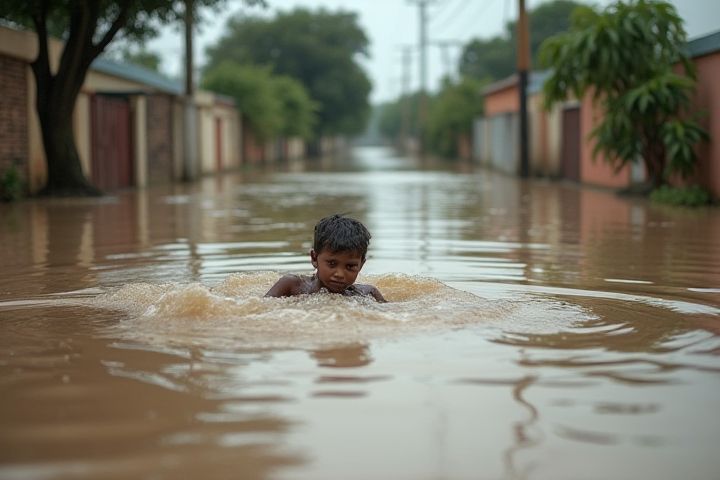
Flooding in Nigeria poses significant challenges, exacerbated by climate change and inadequate drainage systems. Seasonal rains, particularly during the monsoon period, often lead to rivers overflowing, affecting urban and rural areas alike. Infrastructure damage includes collapsed roads, destroyed homes, and loss of agricultural land, resulting in substantial economic setbacks. Many communities face health risks due to waterborne diseases as stagnant water becomes a breeding ground for mosquitoes. Your understanding of these issues can support efforts in disaster management and improve resilience strategies for affected populations.
Causes: Heavy rainfall and poor drainage systems
In Nigeria, flooding is primarily triggered by heavy rainfall, particularly during the rainy season, which can lead to rivers overflowing their banks. The inadequate drainage systems in urban areas exacerbate the situation, as they struggle to efficiently channel excess water away from populated regions. Poor land-use planning and deforestation further contribute to increased runoff, overwhelming these already deficient drainage infrastructures. As a result, communities often face significant economic losses, disrupted transportation, and threats to public health due to waterborne diseases.
Regions affected: Niger Delta, Lagos, and Northern states
Flooding in Nigeria significantly impacts regions such as the Niger Delta, Lagos, and the northern states, each facing unique challenges. The Niger Delta frequently experiences catastrophic floods due to heavy rainfall, exacerbated by poor drainage systems and oil exploration activities that lead to environmental degradation. In Lagos, the combination of urbanization, inadequate infrastructure, and rising sea levels results in persistent flooding, particularly in low-lying coastal areas. Northern states, while encountering seasonal floods, are increasingly affected by climate change and desertification, impacting agriculture and livelihoods in the region.
Impact: Displacement, property damage, and loss of life
Flooding in Nigeria has resulted in significant displacement, leaving thousands homeless as communities are submerged. The destruction of property is substantial, with homes, businesses, and infrastructure severely damaged or completely washed away. Tragically, the loss of life due to flooding events compounds the tragedy, drawing attention to the urgent need for effective disaster management strategies. By improving infrastructure and enhancing early warning systems, you can help mitigate the impact of future flood disasters in vulnerable regions.
Government response: Emergency relief efforts and infrastructure projects
Nigeria has faced significant flooding challenges, prompting government response through various emergency relief efforts. The National Emergency Management Agency (NEMA) has been pivotal in distributing food supplies, medical assistance, and temporary shelters to affected communities. In addition to immediate relief, the government is investing in infrastructure projects designed to improve drainage systems and build flood-resistant facilities, aiming to mitigate future flood risks. Engaging local stakeholders and international partners, these initiatives reflect a comprehensive approach to enhancing resilience against flooding disasters in Nigeria.
Climate change: Increasing frequency and severity
Nigeria faces escalating flooding issues driven by climate change, significantly impacting agriculture, infrastructure, and public health. Rising temperatures and irregular rainfall patterns exacerbate the vulnerability of flood-prone regions, leading to damage worth billions in economic losses. Communities near waterways frequently experience devastating floods, with migration and displacement becoming a pressing concern. Addressing these challenges requires proactive measures, including sustainable land use planning and comprehensive flood management strategies to mitigate risks and protect vulnerable populations.
Economic cost: Significant impact on agriculture and livelihoods
Flooding in Nigeria poses severe economic challenges, particularly affecting agriculture and local livelihoods. The inundation of farmlands results in crop destruction, leading to reduced food production and increased food insecurity. Farmers face mounting financial losses, with damages often exceeding millions of naira, which hampers investment in future agricultural initiatives. As a result, communities reliant on farming struggle to sustain their livelihoods, exacerbating poverty levels and undermining economic stability in the region.
Environmental effects: Soil erosion and water contamination
Flooding in Nigeria leads to significant environmental challenges, primarily soil erosion and water contamination. The excessive runoff caused by intense rainfall displaces topsoil, reducing agricultural productivity and harming local ecosystems. Contaminated water supplies result from floodwaters mixing with pollutants, putting communities at risk of waterborne diseases. Addressing these issues is crucial for ensuring sustainable development and protecting the health of affected populations.
Urbanization: Uncontrolled growth exacerbating problems
In Nigeria, rapid urbanization is a significant factor contributing to severe flooding issues, particularly in densely populated areas like Lagos and Port Harcourt. The expansion of settlements often encroaches on natural waterways, obstructing drainage systems and increasing surface runoff. Poor infrastructure development, coupled with inadequate waste management, further amplifies the risk of flooding during heavy rainfall, leading to displacement and economic losses. You can enhance community resilience through effective urban planning and sustainable practices that mitigate the impacts of flooding.
International aid: Support from global organizations
Nigeria has been grappling with severe flooding issues that have devastated communities and disrupted livelihoods, prompting a collective response from international organizations. Notable entities such as the United Nations and the Red Cross have mobilized resources to provide emergency relief, including food, healthcare, and temporary shelter. These global organizations are also working on long-term strategies to enhance Nigeria's resilience to future floods, such as improving infrastructure and implementing sustainable water management practices. Your awareness and support can significantly boost these initiatives, promoting a collaborative effort to mitigate the impact of flooding in vulnerable regions.
Solutions: Sustainable urban planning and early warning systems
Sustainable urban planning in Nigeria emphasizes the integration of green spaces and proper drainage systems to mitigate flooding risks in densely populated areas. Implementing permeable surfaces in construction can enhance water absorption and reduce runoff, while retaining natural water channels preserves ecosystems and helps manage stormwater. Early warning systems utilizing advanced meteorological data and community engagement ensure timely alerts, enabling residents to prepare for potential flood events. By prioritizing these solutions, Nigeria can significantly reduce the impact of flooding and protect both lives and infrastructure.
